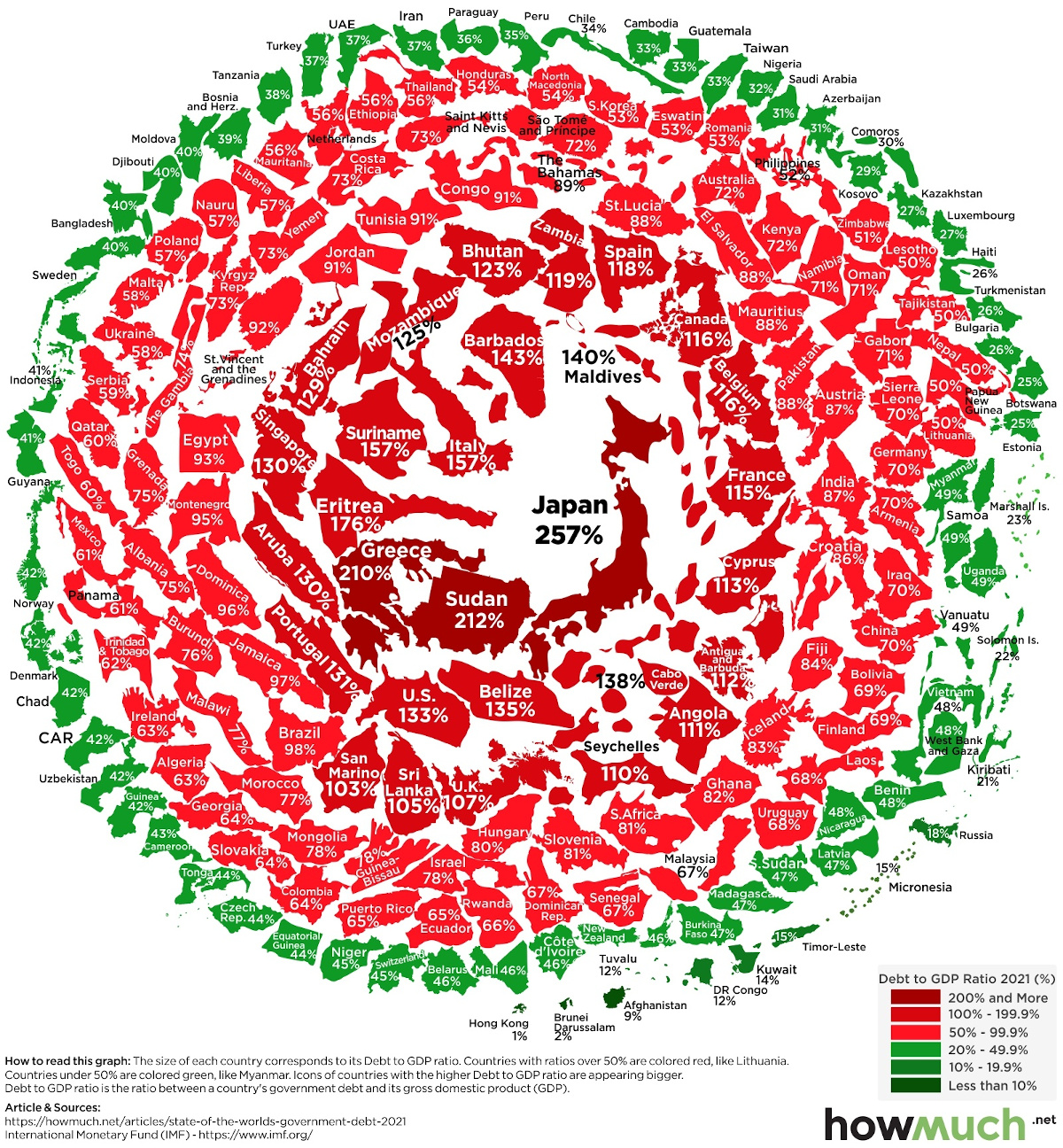Debt as a function of GDP
Over the weekend I try to brush up on the general financial acumen and try to find what interesting items going on around the world that is fundamentally important. This weekend I came across a nice plot on debt to GDP ratio of all the countries of the world (most of them anyways). I was especially interested in Japan. I was reseraching on Japan's deflationary spiral for the last several decades and its social impact.

This is a fascinating way to plot the data. This is the main item I enjoy from visualcapitalist, they represent the data is such a way, few others can. The way to read this plot is quite simple. Each country is represented by their respective map. Their size is proportional to their net debt to GDP % that they carry. Also they are color coded and arranged like Dante's spiral map of hell from a top view as depicted by Sandro Botticelli. I am not sure if that is intentional, but that is the impression I got.
Is high debt bad?
This is not an easy question to answer. Less then 50% debt to GDP is colored green on this chart. Meaning that is an 'acceptable' debt a nation can take. One of the Eurozones criteria was 60% debt to GDP ratio can be considered ideal.

If you look at the heatmap above, you can see that Germany, the largest and most stable economy of the Eurozone maintained near 60% Debt-to-GDP ration for the last 2 decades nearly. Also of note is Portugal, Italy and especially Greece plunged into higher and higher debt since the financial crisis of 2007-08.
No debt for a country is not necessarily good either. It can be caused by a number of different things, like low credit rating, lack of innovation, lack of external investment, or ability to do external investment. Whatever, the reason may be, an extremely low number doesn't mean that the country is doing good economically. It can mean that the country is not using its financial ability or resources properly.
It gets even more complicated at the high end. It is easy to comment that high debt is bad. While it is true, especially when it it above 100%. The first economically advance country to cross the 100% threshold was Japan. It remains at the top of the debt pyramid with a staggering current debt to GDP ratio of 257%. But the funny thing is that was during 1990s, when Japan crossed 100% debt to GDP, nearly 30 years back, and stayed there. If you have predicted Japan as a economic power would be collaping soon back then in the 1990s, you are seriously wrong. They have successfully fought high debt for nearly 30 years now, and I can't say that their economy is collapsing! Yeah, granted, they have deflation for 20 years plus, nearly constant stimulus, and negative interest rate. But is the country really doing terribly with this high debt to GDP ratio? I think not.
However, there are several on the top of the debt list that are nearly collapsing economically, like Sudan, Greece, Eritrea etc... to name a few. So bottom line there is no easy answer. Debt can be managed and for an extended period of time as well.
Disclaimer: This is NOT professional advice, this is all just my own opinion and experience. I am NOT a Certified Financial Adviser. Consult professionals for any financial, accounting or legal related questions you have.
Charts are created in Tradingview.com, which is a free service.

Posted Using LeoFinance Beta
Debt can be managed although it's not advisable to be or become a debtor because once you are indebted you will not be happy all the time as you may keep thinking and thinking about ways to pay it out.
Debt will make you weak and feeble, not having a say if your own but debts can be control if only you as an individual can vividly outlined those constraints that make you a debtor and avoid using it. Thank you.
I was mostly talking about nations, not individuals.
You say you are a novelist. What's your novel?
"The throne is mine"
I am working on it, I'll drop it in few weeks
Thanks for your corrections I appreciate 🙏